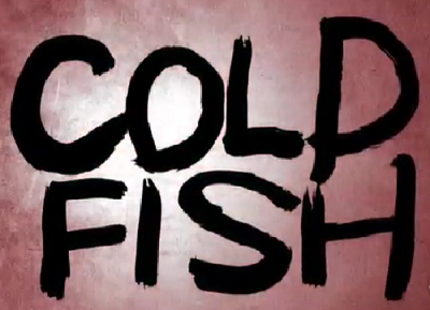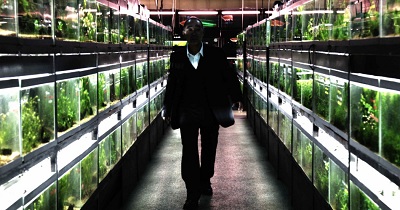MIFF11 - COLDFISH Review

The Melbourne International Film Festival
(MIFF) is in its glorious 60th year and if the initial days of
screenings are anything to go by, it will definitely be one to remember. I have
outlined some MIFF picks, and hope after reading this you will seek out these
films at the other sessions they are playing or elsewhere if you are not in
Melbourne.
Cold Fish tells the semi-true accounts of a tropical fish owner Shamoto (Mitsuru
Fukikoshi) and his fractured family who meet an entrepreneur in the same
business. Murata (Denden) is the hugely successful owner of amazon Gold, he
hires Shamoto's daughter Mitsuko (Hikari Kajiwara) after she is caught stealing
from a convenience store in an effort to keep her out of further trouble. Alarm
bells start to ring however when Mitsuko is integrated into the shop and lives
there in a campus-like environment with the other Amazon Gold girls. As Shamoto's
marriage and relationship with his daughter crumbles, he realizes Murata is not
who he seems and unwillingly spirals into chaos, death and madness with him.
Sion Sono's
Cold Fish revels in despair and darkness.
It makes no concessions and does not hold back. Every character is inherently flawed;
the cast on display here are some of the worst human beings imaginable. Shamoto's
family situation is dysfunctional, Murata and his wife have issues that need no
explanation and the supporting characters only aid in the madness or fall
victim to it. The deep ceded catalyst for this insanity is not explained, but
instead reverted to the females in the film. Cold Fish opens with Shamoto's young, unhappy and uncaring wife
Taeko (Megumi Kagurazaka) frantically piling every instant Japanese meal she
can into a shopping basket. The snap pacing here is ingenious as sections of
her shopping are missing then she is home and like a Polaroid effect, each meal
is heaped into the microwave and instantly thrown onto the table with no time
passing as the microwave dings; a chaotic and unsettling start to an otherwise
boring dinner.
This is the
instant life the family leads, they eat and not a word is spoken, in true Sono
form the rebellious daughter leaves the table without a word and meets her punk
lover as they speed off. This is almost a parody in the sense of unrealism in
the scenario that plays out but there is no time for this and Cold Fish forces the situation along
with exact dates and times. Evidence that something is going to happen, this
ominous time stamp sporadically appears to build up some tension, along with
the timing and structure of each scene that initially appear quite harmless,
but underlie a sense of intense foreboding. Cracks begin to show in Shamoto and
after his daughter is released from her petty theft charge, the indelible Murata
waves away the charges and invites Shamoto and his family to his much larger and
diverse tropical fish store.
Not much
happens on the outset but there is a terrible façade that all characters are
wearing and it is painfully obvious. Murata's sociopathic wife Aiko (Asuka
Kurosawa) slides up beside Shamoto while he is peering into a fish tank and it
is already obvious things are not what they seem. Later Aiko and Murata drop
hints to the lies, deceit and abnormalities, but it is too late. Shamoto is trapped
in the fish tank so to speak; swimming helplessly between his dysfunctional
family and his forced and twisted allegiance to Murata.
This is
definitely a Sion Sono film; carrying over from his other works are the strong
themes of exploited women, cult impressions and the jarring mix of sex and
death. Aiko and Taeko are definitely the catalysts. The two wives fuel the
madness and inhibitions of the men, increasing their pent-up frustration and
madness until breaking point; Shamoto in particular who before his corruption,
lived his life without conflict, intentionally oblivious to the complexities
surrounding him, living in a daydream of the happy memories that are no longer
possible.
Suspicions of
this madness are confirmed when Murata gropes and sexually berates Taeko, but
destroyed when it is revealed that, much like the true crime this is based on, Murata
and his wife and cold and calculating serial killers. Much has been said about
the objectification and exploitation of the women in Cold Fish and it is easy to label the director a misogynist, but
the ill treatment of their respective wives is a animalistic response to their
obvious sexual advances and promiscuous, albeit unrealistic, masochism. There is
no love lost for Aiko, she deserves all the pain and suffering inflicted upon
her, and welcomes it in fits of madness. Murata and Aiko is a deadly coupling
that works very efficiently together to hide the insurmountable murders they
commit. In one scene, before entering the room crying to swear she had nothing
to do with the disappearance of a Yakuza colleague, Aiko is seen outside with
an Amazon Gold girl employee, fondling her with a small hand puppet. This kinky
fetish of lesbianism blurs the line between sex and death and perfectly
accompanies the accusatory scene that follows it because it is mad, unrelated
and thus perfectly explains how far Aiko and Murata will go.
Why did the
Amazon Gold girl accept the sexual harassment so playfully though? This is
another theme Sion Sono is known for and it is his depiction of cult
environment and behavior. When Mitsuko goes to work for Amazon Gold she is
given a room in a shared dormitory that is part of the building. This is
reminiscent of the 'substitute family service' organization's quarters in his
film Noriko's Dinner Table and the
rooms in the Zero building in Love
Exposure. Adding to this is the ritualistic methods of working in the fish
store, particularly the feeding rituals; one smaller animal fed to a larger one
that the girls take perverse pleasure in, and mirrors Shamoto's situation as
Murata slowly consumes him.
Murata is the worst kind of human being; a man that exudes benevolence but hides sadism and sycophantism. He is a true psychopath that utterly enjoys his extreme power plays and dominance over women. Denden gives a truly remarkable performance of a successful business man that is absolutely beyond any form of redemption.
Shamoto on
the other hand loses all forms of innocence when he witnesses the sudden murder
of Murata's associate, and is forcefully taken to a cult-like cabin in the
woods; religious fixtures, trinkets and statues pervade the house. Sion sono's
portrayal of religion has never been a positive one, and the corruption is
prevalent here as Murata and Aiko do unspeakable things to the recently
murdered corpse in this suspiciously sanctimonious place. To hide the evidence
they take perverse pleasure in dismembering and disposal. "Let's circumcise him"
says Murata as Aiko giggles in response. All of this hints at the judgment and
voyeurism to a greater power in their madness. It is lurid, obscene and
disgusting and just the first step of Shamoto's inevitable decline as his view
of a happy family becomes an impossibility due to the estranged relationship he
has with Mitsuko, his wife and his inability to act as he becomes complicit.
It is a
spectacular, explicit display of evil when Shamoto crescendos into madness. It
is forced upon him and all involved delight in the horror, particularly Aiko
who begs for excruciation. What follows is a supremely gory rampage and the
family dinner scene in the beginning is turned on its head and twisted into an
unspeakable scenario that plays out until the destructive climax.
Cold Fish is Sion Sono's true return to form. It is an indictment of the extremes of humanity; the culpability of such sins is explored and laid out with obscene violence and cold calculated despondency, and the results are overwhelming.








